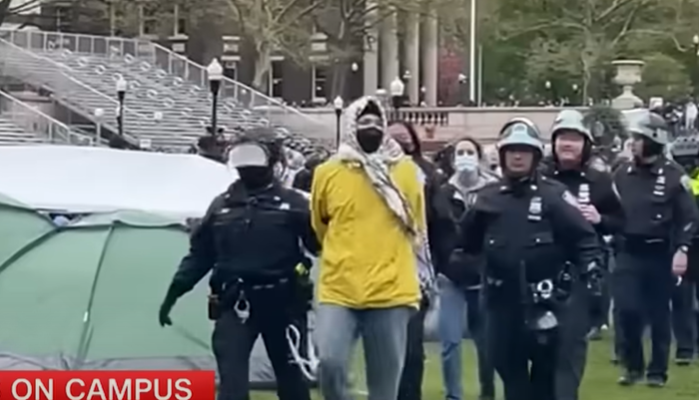Recent campus protests against Israel draw striking parallels to historical accusations against Jews, revealing enduring prejudice.
By Ira Stoll, Algemeiner
Of the analytical frameworks into which to fit the eruption of anti-Israel protests on college campuses, there is no shortage. There’s the “free speech on campus” concept, the Arab-Israeli conflict paradigm, the lawless-university-radicals-of-the-1960s pattern.
The framework that fits the situation most neatly, though, is one that hasn’t been elaborated much. That is the “blood libel,” which a six-page entry in the Encyclopaedia Judaica defines as “the allegation that Jews murder non-Jews, especially Christians, in order to obtain blood for Passover or other rituals.”
The Encyclopaedia Judaica also calls it “a complex of deliberate lies, trumped-up accusations, and popular beliefs about the murder-lust of the Jews and their bloodthirstiness.” The Judaica traces the origin of the story all the way back to Apion, an Egyptian who lived during the first century of the Common Era.
The historian Josephus writes in “Against Apion” that this claim that Jews deliberately sacrificed a non-Jew is “a most tragical fable … full of nothing but cruelty and impudence” and motivated by “an extravagant love of lying.” Josephus, writing in about 100 CE, calls Apion’s tale “a voluntary lie” that operated “to the delusion of those who will not examine into the truth of matters.”
Two thousand or so years later, we’re at it all over again, with the Jews yet again facing a Passover-season lie about deliberately killing non-Jews. So, at Columbia University, the anti-Israel mob renamed Hamilton Hall as “Hind’s Hall,” after a six-year-old Palestinian girl, Hind Rajab, who Israel has been blamed without evidence for killing.
To anyone who knows history, an Easter or Passover-season tale of Jews intentionally killing a child is familiar. The Encyclopaedia Judaica gives the places and dates: Norwich, 1144; Gloucester, England, 1168; Blois, France, 1171; Saragossa, Spain, 1182; Trent, Italy, 1475; Lublin, 1636.
By setting up the pro-Hamas university encampments on the first day of Passover, the anti-Israel protesters provided useful clarity that their false accusations of “genocide” against Israel fell squarely within this age-old tradition of groundlessly accusing Jews of using the blood of Christian children to bake matzo. The protesters also help by making explicit references to “blood.” The Students for Justice in Palestine chapter at the University of Massachusetts, Boston, for example, advertised a series of events with a social media post headlined, “Palestinian blood is on Israel’s hands.”
Elisha Wiesel, son of Nobel laureate and Holocaust survivor Elie Wiesel, writes that his father would ask, “Where are the history lessons on the blood libel, the historical precedent for accusing Jews of murder?”
The Encyclopaedia Judaica entry is by Haim Hillel Ben-Sasson, a professor of history who taught at Hebrew University in Jerusalem. The entry ends with a reference to an essay by Ahad Ha’am, who lived between 1856 and 1927 and was a champion of cultural Zionism.
That essay, “Some Consolation,” was written in Hebrew in 1892. It was brought out in English translation by Leon Simon in 1912 by the Jewish Publication Society, as part of a collection of selected essays by Ha’am. The essay contemplates the possibility that, just as on today’s campuses, some individuals of Jewish background will side with the enemies.
“Since everybody hates the Jews, can we think that everybody is wrong, and the Jews are right?” he quotes a Russian writer as asking. “There are many among us Jews on whom a similar question half-unconsciously forces itself. Can we think, they ask, that all the vicious characteristics and evil practices which the whole world ascribes to the Jews are sheer imagination?”
Ha’am writes that the “useful lesson” of such a baldly false accusation is that it may strengthen Jewish confidence and prevent unwarranted guilt.
“There is nothing more dangerous for a nation or for an individual to plead guilty to imaginary sins,” he says. “Where the sin is real, there is opportunity for repentance; by honest endeavor the sinner may purify himself. But when a man has been persuaded to suspect himself unjustly, how can he get rid of his consciousness of guilt?”
The blood-libel accusation, he writes, “is the solitary case in which the general acceptance of an idea about ourselves does not make us doubt whether all the world can be wrong, and we right, because it is based on an absolute lie.”
He adds, “This will make it easier for us to get rid of the tendency to bow to the authority of ‘everybody’ in other matters.”
Today, the Jews aren’t entirely alone; we are blessed with many allies. Yet it can sometimes, in the media or on campuses or at the United Nations, feel again like everybody is against us. That does not make the accusations true.
Ha’am wrote: “‘But’ — you ask — ‘is it possible that everybody can be wrong, and the Jews right?’”
And here is how the Encyclopaedia Judaica entry on “blood libel” by Ben-Sasson concludes, quoting the Ha’am essay in words that ring as true today as in 1892: “Yes, it is possible: the blood accusation proves it possible. Here, you see, the Jews are right and perfectly innocent.”
Do You Love Israel? Make a Donation - Show Your Support!
Donate to vital charities that help protect Israeli citizens and inspire millions around the world to support Israel too!
Now more than ever, Israel needs your help to fight and win the war -- including on the battlefield of public opinion.
Antisemitism, anti-Israel bias and boycotts are out of control. Israel's enemies are inciting terror and violence against innocent Israelis and Jews around the world. Help us fight back!



